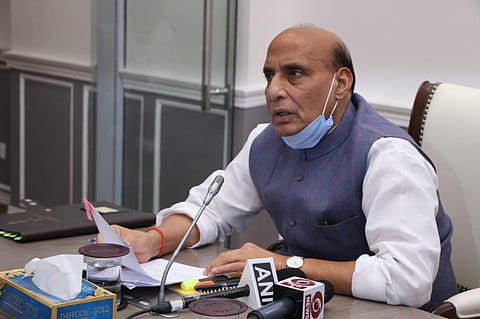

NEW DELHI: In a big push towards defence indigenisation, India on Monday approved restrictions on the import of an additional 108 military weapons and systems such as next-generation corvettes, airborne early warning systems, tank engines and radars under a staggered timeline of four-and-half years.
The first negative list for defence imports comprising 101 items that included towed artillery guns, short-range surface-to-air missiles, cruise missiles and offshore patrol vessels was issued last August.
The restrictions on import of the 108 items that figured in the second list will progressively come into effect in the period from December 2021 to December 2025, officials said.
Describing it as the 'second positive indigenisation list', the defence ministry said it was notified after receiving approval from Defence Minister Rajnath Singh.
"The second positive indigenisation list comprises complex systems, sensors, simulator, weapons and ammunitions like Helicopters, next-generation corvettes, airborne early warning and control systems, tank engines, medium power radar for mountains, MRSAM weapon systems and many more such items to fulfil the requirements of Indian armed forces," it said.
According to a government document, the import restrictions on 49 items including next-generation corvette, some variants of single-engine helicopters, wheeled armoured platform, border surveillance system and armoured engineer recce vehicle will come into force from December 2021.
The embargo on another 21 items will be applicable from December 2022.
The items mentioned in the list included 80 MM Tandem Warhead Rocket, software-defined radio, mechanical minefield marking equipment (land-based) and pontoon mid-stream bridging system.
A separate list of 17 items such as mountain weapon locating radar, smart anti airfield weapon (SAAW) Mk-I and loitering munitions have been identified for import restrictions from December 2023 while the ban on 13 items will be applicable from December 2024.
The import ban on eight other systems and weapons including anti-material rifle(AMR) 14.5 MM 1000HP engine for T-72 tanks will come into force from December 2025, according to the document.
Officials said the second list has been prepared by the defence ministry after several rounds of consultations with state-owned and private defence manufacturing firms as well as leading industry bodies such as the Society of Indian Defence Manufacturers (SIDM).
"The second positive indigenisation list is another testament of the confidence placed by the government and the armed forces on the industry to deliver cutting-edge defence technology for India's security requirements," SIDM President Jayant D Patil said.
He said the list is comprehensive with "truly big-ticket items" to be built in India and will be a great boost to making India self-reliant.
The first negative list of items for defence imports included towed artillery guns, short-range surface-to-air missiles, cruise missiles, offshore patrol vessels, electronic warfare systems, next-generation missile vessels, floating dock and anti-submarine rocket launchers.
"In pursuance of Prime Minister Narendra Modi's endeavour of 'Atmanirbhar Bharat' and to boost indigenisation in the defence sector, Defence Minister Rajnath Singh has approved a proposal of the Department of Military Affairs to notify the 'second positive indigenisation list' of 108 items," the defence ministry said.
"This will give a further boost to indigenisation with the active participation of public and private sector for fulfilling the twin objectives of achieving self-reliance and promoting defence exports," it said.
The ministry said all the 108 items will be procured from indigenous sources as per provisions of the Defence Acquisition Procedure (DAP) 2020.
"The second list lays special focus on weapons/systems which are currently under development/trials and are likely to translate into firm orders in the future.
Like the first list, import substitution of ammunition which is a recurring requirement has been given special focus," the defence ministry said in a statement.
"Not only does the list recognise the potential of the local defence industry, it will also invigorate impetus to domestic research and development by attracting fresh investment into technology and manufacturing capabilities," it said.
In the last couple of years, the government has taken a series of measures to boost the domestic defence industry.
On August 9 last year, Singh announced that India will stop the import of 101 weapons and military platforms like transport aircraft, light combat helicopters, conventional submarines, cruise missiles and sonar systems by 2024.
Subsequently, the defence ministry released the first list of items, with a detailed timeline, which will not be allowed to import.
The new defence procurement policy of the defence ministry projected a turnover of Rs 1.75 lakh crore (USD 25 billion) in defence manufacturing by 2025.
India is one of the most lucrative markets for global defence giants.
The country figured among the few top importers of military hardware in the world for the last eight to ten years.
According to estimates, the Indian armed forces are projected to spend around USD 130 billion in capital procurement in the next five years.
"The defence industry can gainfully utilise this golden opportunity to build robust research and development facilities, capacities and capabilities to meet the futuristic requirements of the armed forces," the ministry said.
"This list also provides an excellent opportunity for 'start-ups' as also MSMEs which will get a tremendous boost from this initiative," it said.
It said the ministry, the Defence Research and Development Organisation (DRDO) and service headquarters will take all necessary steps, including hand-holding of the industry, to ensure that the timelines mentioned in the new list are met.